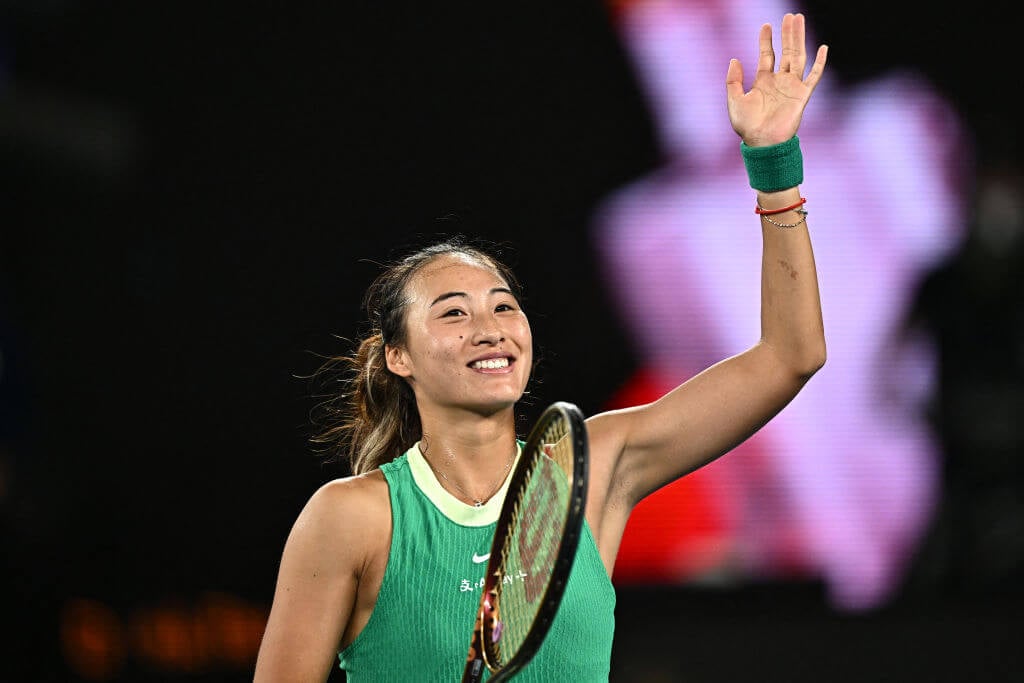Zheng Qinwen has reached her first Grand Slam final. In fact, she is the first person from China to do so in 10 years.
Zheng grew up watching the last Chinese Grand Slam winner, Li Na, and has said she has watched the 2014 Australian Open final ‘at least 10 times.’ If you have been on tennis social media, no doubt you will have come across the image of Zheng watching Li win 10 years ago, transfixed by her achievement. Tennis in China was expected to boom as a result.
This was Qinwen Zheng watching Li Na winning the 2014 Australian Open title.
Ten years later, Zheng is into the 2024 Australian Open Women’s Final, becoming the first Chinese singles finalist at a Major since Li Na, herself.
🥹👏🇨🇳 pic.twitter.com/N2PRhT0u45
— Olly 🎾🇬🇧 (@Olly_Tennis_) January 25, 2024
It has taken until now for that to start to come to fruition.
Advertisement
One viral video this week saw Li sneak up on Zheng mid-interview and greet her like you would your best friend — with a smack on the bum. Zheng says they had barely met before this tournament. It is not every day you get to not only meet your idol but become buddies with them, too.
Li Na surprising Qinwen after she specifically brought her up in her post-win interview today 🥹
🎥 @AustralianOpen pic.twitter.com/BozJdXRJvD
— Bastien Fachan (@BastienFachan) January 20, 2024
But before you go any further, stop and read this piece by Matt Futterman. It is the heart-wrenching story of Zheng Qinwen’s childhood when, as a seven-year-old, she was taken by her father to Wuhan to display her talent to a higher-level coach.
The major detail her father kept from her? She would be staying there.
He would not.
What else do you need to know about her?
Australian Open journey
The end of Zheng’s 2023 season was kiboshed by the return of Naomi Osaka. Wim Fissette had been her coach and the key to her climbing the rankings in 2023, reaching the quarterfinal of the U.S. Open before being stopped in her tracks by one Aryna Sabalenka, her opponent for Saturday’s final.
Osaka’s return to the sport after the birth of her first child, Shai, meant a reunion with Fissette. Zheng was devastated. “There is nothing I want to say about Wim Fissette,” she told reporters earlier this week.
That led Zheng to do the same and reunite with coach Pere Riba, who was alongside Coco Gauff during her success at the U.S. Open in 2023.
Zheng’s route to the final has been without any great hurdles. Not once has she played someone within the top 50. Her highest-ranked opponent was Great Britain’s Katie Boulter (54). That said, she has spent more than 11 hours on court.
This creates a small issue when analysing Zheng’s game because she has not been tested by anyone remotely close to her ranking at this Grand Slam.
Style of play
Sliding and stretching around the court, Zheng uses all of her 5ft 10in (178cm) frame to reach the ball and fizz back a forehand, often slicing it on the long diagonal. As a result, she has hit 165 winners over the past two weeks. This is a skill noted by Sabalenka, who said following her semifinal victory: “I think her (Zheng’s) forehand is her best shot. It’s quite heavy.
Advertisement
The new top-10-ranked player really tests the length of the court, too, hitting the lines, leaving little margin for error.
In addition to that powerful forehand, her serve is one to watch. She has 48 aces and counting for the tournament, the best in the women’s draw. By contrast, Sabalenka ranks third and has half that total.

Zheng Qinwen celebrates victory against Dayana Yastremska in the semifinal (Lillian Suwanrumpha/AFP via Getty Images)
The main battle she faces is thinking too much. “I think at the beginning of the first set I’m just thinking too much… Of course, that’s one of my problems,” she said after her quarterfinal. “So when I lost the first set directly, I tried to tell myself: ‘Stay focused. Don’t think too much. Just focus right now.’”
Li offers a similar observation. “It’s really simple advice: don’t think too much.”
Expect the Rod Laver Arena to be filled on Saturday with shouts of “jiayou”, which means “vamos” in Mandarin, as Zheng looks to emulate her idol and win at Melbourne Park.
Zheng is excited to reach the final. Someone just remind her to not think about it.
(Top photo: Cameron Spencer/Getty Images)
